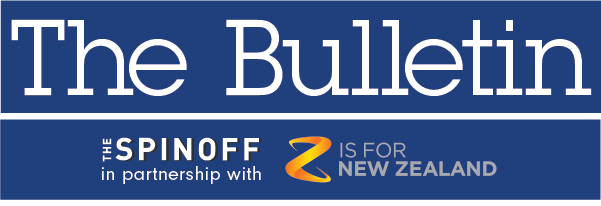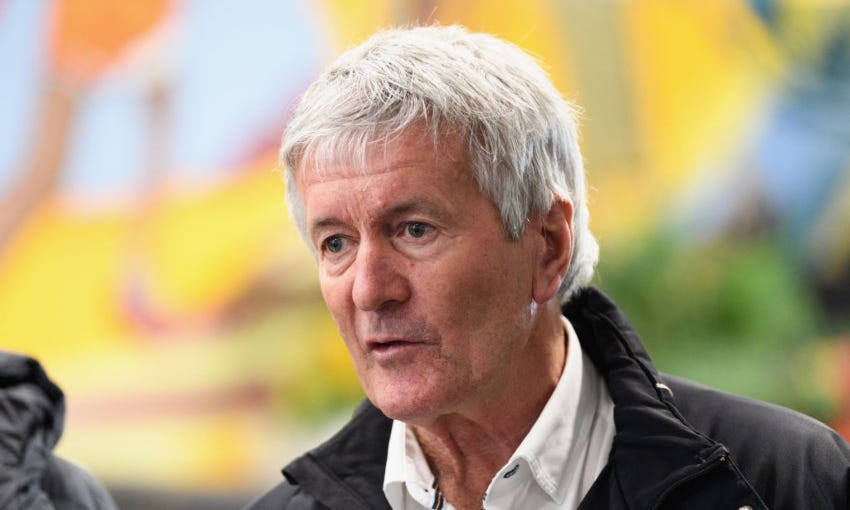Damien O'Connor's major trade mission
The minister is in the UK trying to thrash out two stalled free trade deals
Good morning and welcome to The Bulletin for Thursday 17 June, by Alex Braae for The Spinoff. Presented in partnership with Z Energy.
In today’s edition: Damien O'Connor's major trade mission, in principle agreement made to give RBNZ debt serviceability tools, and big vaccine rollout announcement coming today.
Image: Trade and agriculture minister Damien O’Connor (Getty Images)
Trade minister Damien O'Connor is currently in the UK, seeking to make things happen on free trade agreements with both the United Kingdom and the European Union. And there are some "tricky issues" to get through, according to the minister. Rural News Group reports that agriculture – a perennial sticking point for NZ trade – is likely to be one of them. The negotiations have dragged on for a long time, with the UK now into the 5th round of talks, and the EU into the 11th round.
O'Connor's trip is the first major overseas mission by a minister since Covid started, and he told Rural News "I hope that by undertaking this trip in difficult Covid times will demonstrate to them the importance we place on both these agreements." Beyond the FTAs though, it appears his priority as trade minister will be working out more sector-specific agreements. Just before leaving, O'Connor told Newsroom's Sam Sachdeva that it makes more sense to build on areas of agreement, rather than getting bogged down in what countries don't agree on. Incidentally that whole interview is a really insightful look at New Zealand's place in the trading world right now.
When it comes to exporting to Britain, Australia appeared to score a big win this week. PMs Scott Morrison and Boris Johnson announced an agreement had been reached, and the Guardian reports it involves some wins for Australian meat farmers, with tariffs to be eliminated over a decade. Dairy tariffs will go in five years. That's potentially similar to what New Zealand's negotiators are hoping for – we'll have to wait and see whether Australia's success in this area means anything for the New Zealand government's chances.
An in-principle agreement has been made to give the Reserve Bank "debt serviceability" tools, which could potentially restrict some real estate lending. Interest reports it isn't a done deal yet, with various feasibility and consultation rounds to go through. Finance minister Grant Robertson is also keen to make sure first home buyers aren't impacted. But the move underlines noises governor Adrian Orr has been making recently with regards to highly leveraged homeowners, and their ability to maintain their mortgage payments. Basically, the RBNZ sees risk right now to the stability of the financial system because of high levels of mortgage debt.
It's a very uncomfortable question to ask, but will New Zealand have to one day let Covid-19 in? Writing for The Spinoff, Laura Walters has reported on various perspectives on that. New Zealand is in a completely different position to the rest of the world, which is starting to open up again, but only after 18 months of being hammered. What we do know is that the border won't just be thrown open when the vaccination process finishes, but beyond that it gets more tricky to predict what will happen.
On this point, a big announcement will be made today about the next stage of the vaccine rollout. Analysing it all, the (paywalled) NZ Herald's Derek Cheng writes that it's a moment in which the messaging from PM Ardern will once again become all-important, both to encourage confidence in the rollout, and to keep expectations of speed in check. Because of the choice to go with Pfizer, the government is now in a position of having to hope that vaccine shipments actually come through.
A paid message from our partners at NZ Post: In the second part of our partnership with NZ Post, Russell Brown speaks to a few of the organisation’s decision makers about 2020 and the future.
The Greater Wellington Regional Council is likely to push for public transport to be put back into some form of public ownership, reports Radio NZ. It comes at a time when the government is consulting on the Public Transport Operating Model, which governs this sort of infrastructure. It's a particularly live issue in Wellington right now, with recent bus driver strikes. On that, Stuff reports a new offer has been put to the union, which will be voted on next week.
Meanwhile in Wellington transport news (it's a busy beat) the plan to make the Golden Mile car-free has been approved, reports Stuff's Damian George. There will still be bus lanes, but by and large Lambton Quay, Willis St, Manners and Courteney Place will be given over to pedestrians and cyclists. Mayor Andy Foster said local authorities will work closely on the implementation with the business community, some of whom are unhappy with the changes.
The government has confirmed a $100 million offer of financial support to Emirates Team NZ has been rejected by the syndicate. The NZ Herald reports PM Ardern said the government went into the negotiations in good faith, and made " every endeavour to hold and host the race here", but that they also had to consider when such support would stop offering "value for money". She has also suggested the public make their voices heard on the issue. The decision doesn't necessarily mean the Cup will go offshore – rather, it just means the exclusive window for negotiations between the government and ETNZ has closed, so now the syndicate can openly shop it around, as opposed to the quiet shopping around that was taking place during the actual regatta.
Got some feedback about The Bulletin, or anything in the news?
Drop us a line at thebulletin@thespinoff.co.nz
Right now on The Spinoff: Michael Appleton writes about the big questions ahead of the WTC cricket final starting tomorrow night. Hal Crawford looks at the global trend for mega-mergers, and how New Zealand can lead the world in video streaming. Joe Canham looks at what it will cost to get an EV eligible for a new rebate. Troy Kingi talks about his brush with death while diving for crays, in a new episode of First. Don Rowe reviews the new Paddy Gower documentary about New Zealand's problem with meth. Canadian Justin Giovannetti assesses whether anyone over here is making proper poutine.
And a few more Gossip Week pieces: Elle Hunt writes about realising a passion for gossip while locked down in London. I ask around senior journalists for their take on the rules of talking "off the record" – and whether you can trust journalists to keep their mouths shut with secrets. And our Cub Reporter returns with the first edition of gossip column Jamboree in years.
I got more curious about the growth of Canterbury town Rolleston after reading a story in yesterday's Bulletin, so decided to read up more on it all. So for a feature today, one of the pieces I stumbled across: The conservative think-tank Maxim Institute puts out a publication called Flint and Steel, and a 2018 edition had a wonderful story about the town putting in place one of the true building blocks of a community – a high school. Here's an excerpt:
In order for communities to flourish, there needs to be common places of connection. Over a decade of watching the town’s rapid expansion, Jackie began asking herself how her town could retain a sense of connectedness and common identity, especially as her three kids started growing up through the local primary schools. While Rolleston was attracting new commercial amenities like supermarkets and fast food outlets, she knew that unless someone started lobbying for a high school in town, her kids would have to spend the majority of the week away from their community and she would lose touch with other parents as their teenagers dispersed.
“Rolleston has been a little bit soulless,” says Sam. “It’s been a place where people live, but travel away for work. Children have grown up here, but haven’t been able to stay for high school. Schools provide a place for all families to connect and grow together. When it stops at the intermediate level, there’s no longevity of relationships.”
In sport, a magnificent piece featuring a sporting talent factory I had no idea existed. LockerRoom's Suzanne McFadden has profiled breakout hockey star Katie Doar, a 19 year old with silky ball control who will be playing for the Black Sticks at the Olympics. A remarkable aspect of it all – Doar will be the 15th Black Stick to come out of Kamo Intermediate, a small school in Northland, including Katie's older sister Madi and current skipper Stacey Nicholsen.
That's it for The Bulletin. If you want to support the work we do at The Spinoff, please check out our membership programme.







